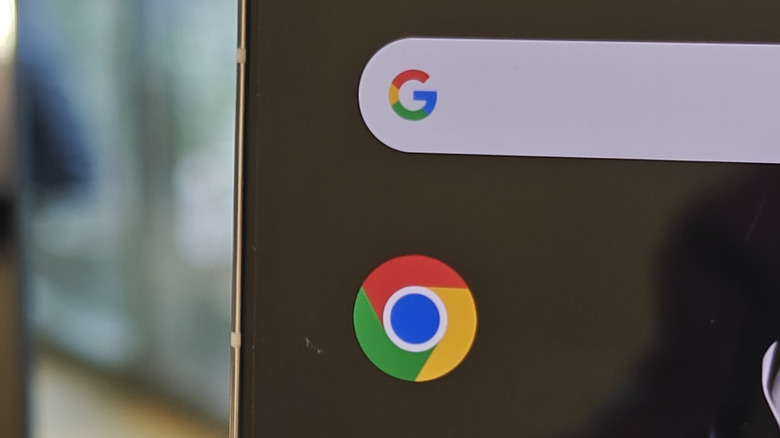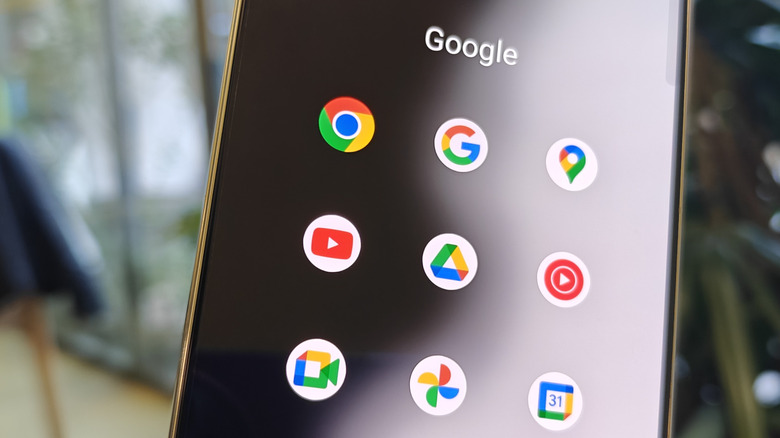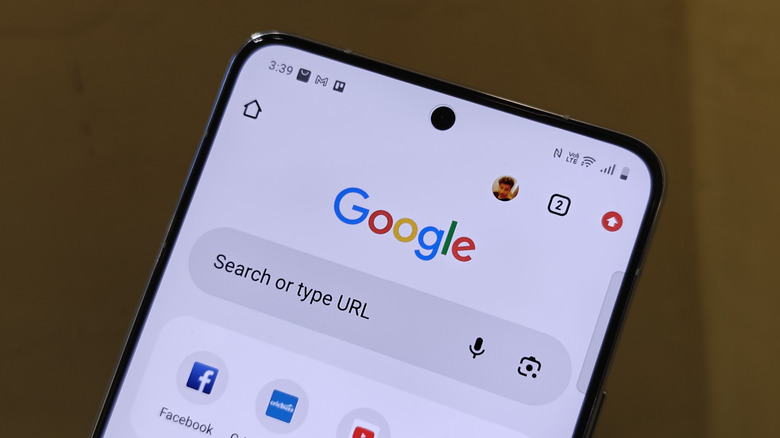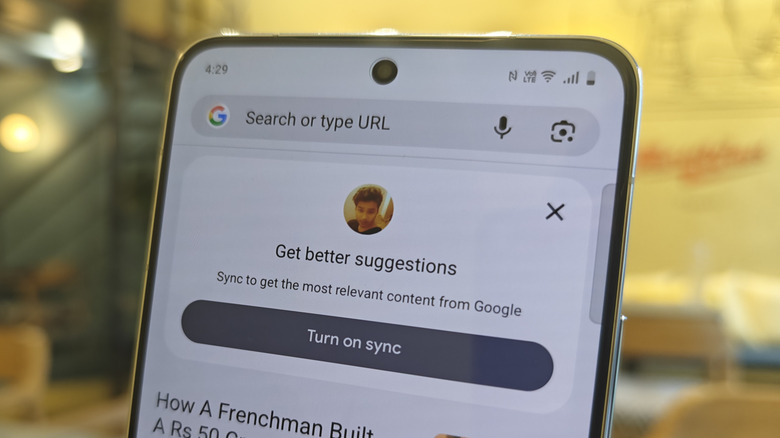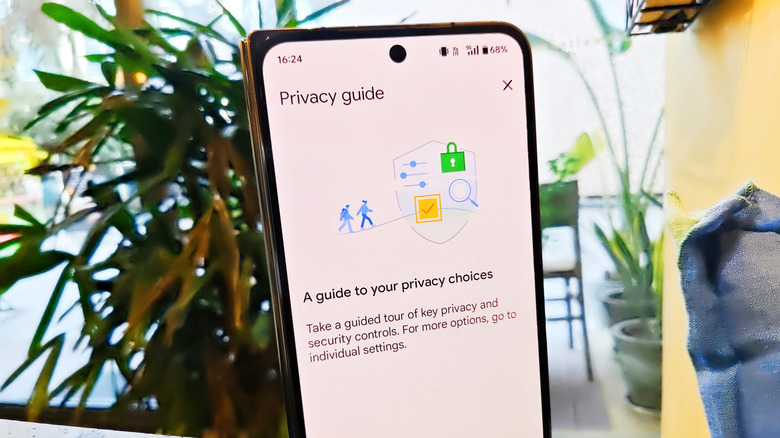Here's What Could Happen If Google Is Forced To Sell Chrome
Chrome is one of those browsers that is synonymous with the Google brand identity, which means you see its footprint everywhere across the company's products. If history has taught us anything, it's that such close association on a Big Tech platform only means bad news for the competition, and the average user, by that extension. The U.S. Department of Justice wants Google to break Chrome into a separate business because of competition concerns and how it was helping create a monopoly in the search and advertising business.
The latest legal tussle involving Google has experts scurrying to find similarities with the landmark Microsoft antitrust case over two decades ago. The lengthy United States vs. Microsoft antitrust battle, which had Internet Explorer at the center of it, is a close example. However, the internet has matured dramatically since the heyday of Internet Explorer, as browsers are no longer just about visiting the web. They are the center point of a deeper web that binds together user activity tracking and targeted advertising.
It is, therefore, no wonder that Chrome could go for as much as $20 billion if Google is forced to sell the browser business. Now, a final ruling is only expected to arrive in the latter half of 2025, but August 2024 has already made it clear that Google is viewed as a monopoly in the online search and advertising market. So, even if a sale doesn't materialize, we can expect some big changes in how Google moves ahead with Chrome and the ecosystem built around it.
Can Chrome remain free without Google?
Chrome's value is worth billions of dollars on its own, and on top of that, it offers unhindered access to Google's search engine. Spending to the tune of an estimated $20 billion for Chrome — which is arguably the most advanced browser out there on both mobile and desktop platforms — would mean the buyer could theoretically look for a fast way to reap a return on their fat investment. There are only a few ways to do that at scale. The first one is to put a premium on accessing Chrome, which would dramatically diminish its appeal as Google has offered it free so far.
Another option is to somehow monetize it, a web that inevitably entangles Chrome once again with Google Search, the biggest search engine out there by an overwhelming majority. In the hands of another company, Chrome's convenient access to Google Search or its ad network could either get technically hobbled or pushed behind a premium. In either case, there are going to be overhead costs, and recovering that won't be easy for any company spending billions of dollars to buy Chrome. So, we're back to square one.
Finally, there's the challenge of technical development. Google is in a uniquely advantageous position to keep innovating Chrome. A buyer likely won't play by the same rules. "Few companies would have the ability or incentive to keep them open source, or to invest in them at the same level we do," notes Lee-Anne Mulholland, Vice President of Regulatory Affairs at Google.
Will Chrome survive without Google?
Selling off Chrome would pose an existential threat. Curiously, it once again harkens back to the "browser wars" era, when Microsoft launched Internet Explorer as a free tool, crushing Netscape and forcing the monumental open-source release of the latter's code. From the ashes rose Mozilla, which eventually spawned the Firefox browser as we know it today.
Notably, the very survival of Firefox depends on the money it gets from Google, despite being a Chrome competitor. That's because Google reportedly pays Mozilla to the tune of half a billion dollars each year to keep Google Search as the default search engine. A team of researchers highlighted the same conundrum in a research paper discussing the unique antitrust paradox of Chrome.
"The precedent set by Mozilla's financial dependence on Google highlights potential challenges for Chrome in maintaining its operations without similar support," says the research paper. The paper also makes a case for the reverse scenario, arguing that Chrome definitely offers enough incentive for Google to keep investing billions of dollars into its development, which means a buyer(s) would likely pour money to extract the benefits.
But the buyer has to be a deep-pocket entity, preferably from the Big Tech pool. However, such an exchange of hands would again raise antitrust alarms. Google, on the other hand, already has an eponymous app that offers browsing perks. It won't take the company too much time to make it the next avenue for accessing its search engine and other services.
More choices at the cost of degraded experience?
Whoever ends up snagging Chrome, the biggest challenge would be to keep it competitive in terms of convenience as well as functionality. Right now, Chrome acts as a direct window to not just Google Search but also to other Google services ranging from the Gemini chatbot and the AI-fied search answers to Gmail, Map, and the entire Workspace suite. Decoupling the Google productivity suite from Chrome and its seamless interplay could deter buyers.
All these services come as a default to users, and consumer psychology tends to stick with the defaults unless there is a strong incentive to look elsewhere. The court's ruling in the antitrust case has a whole section dedicated to "The Power of Defaults," citing a massive proportion of search queries originating from default access points, such as Chrome and Android OS.
Even if Google is forced to sell Chrome, the open-source Chromium project that underpins it — and a host of other browsers such as Microsoft's Edge, Brave, Opera, and Vivaldi — would still rely on Google's development work. "If they're really just saying, 'Give up Chrome,' that would be very weird because Google would still control all the underlying technology and they could just tank anyone who would try to do stuff with it, including anyone who ends up owning Chrome," notes Christo Wilson, a professor of computer science at Northeastern University.
Then there's the question of making money from the hefty Chrome investment. A focus on returns would also mean lower margins for development and functional downgrades for users, at least in the short term.
The big privacy catch
Assuming the DOJ's push for spinning Chrome out of Google's conglomerate is successful, the biggest beneficiary (or loser) would be Google Search. Some of the testimonies in the antitrust offer a clear look at how the company built a wall around Google Search and what the outcome could be.
"When the court asked why Google pays billions in revenue share when it already has the best search engine, he answered that the payments "provide an incredibly strong incentive for the ecosystem to not do anything"; they "effectively make the ecosystem exceptionally resist[ant] to change"; and their "net effect ․ [is to] basically freeze the ecosystem in place[.]" wrote U.S. judge Amit Mehta, citing a testimony provided by Dr. Sridhar Ramaswamy, a Google Search veteran and former Senior Vice President of Ads and Commerce at Google.
To fix the problematic conduct, the DOJ has requested that Google start sharing ad data at no cost with competitors and do something similar for user data as well as access to the Search Index, including data listed on Google-owned platforms such as YouTube. The remedy seeks to share the data with "suitable security and privacy safeguards" in tow.
Google argues that doing so would open the doors for "major privacy and security risks," citing how AOL unintentionally exposed the search data of over half a million users. Targeted harassment, doxxing, surveillance, aggressive ad targeting by third parties, and profiling are just some of the possible outcomes if the search and ad data fall into the wrong hands.
